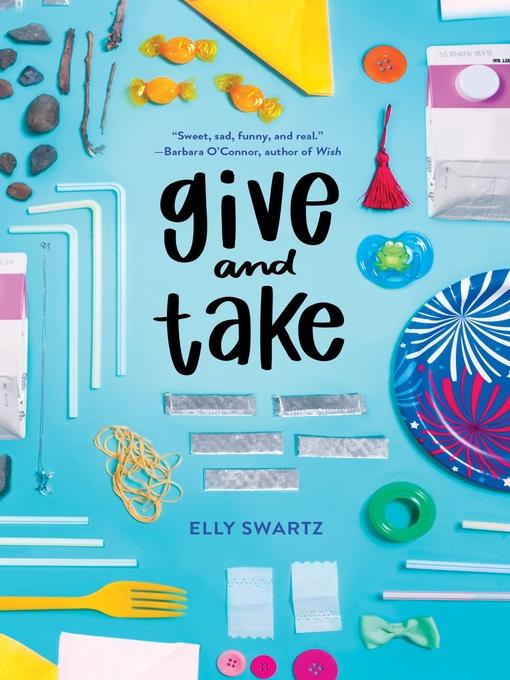
Give and Take
فرمت کتاب
ebook
تاریخ انتشار
2019
Lexile Score
630
Reading Level
2-3
ATOS
4
Interest Level
4-8(MG)
نویسنده
Elly Swartzشابک
9780374308209
کتاب های مرتبط
- اطلاعات
- نقد و بررسی
- دیدگاه کاربران
نقد و بررسی

September 1, 2019
Gr 4-6-Twelve-year-old Maggie holds on to her memories-literally. She can't stop herself from taking small items as reminders of special people and events in her life: Chinese takeout containers, milk cartons, dirt cups she used for a third grade project, gum wrappers, and a little sock that belongs to Izzie, a foster baby who is staying for "a speck of time" with Maggie's family. Maggie desperately wishes her family would adopt Izzie, but there are other things she is fearful of forgetting, especially memories of her grandmother, who died and had dementia. By hiding boxes in her bedroom, Maggie is sure she will remember every treasured moment. But when her collection is threatened, Maggie's explosive anger makes it clear to her concerned parents that she needs professional help. When her parents take her to a counselor, Maggie is initially resistant, but she learns how to let go of things and trust her heart to store her memories. Maggie is also a talented trapshooter, a sport underrepresented in books for young readers. When a boy is added to Maggie's all-girls trapshooting squad, she makes a new friend who also strengthens her bonds with her teammates. Several of the novel's strongest scenes belong to the distinctive secondary characters, including Maggie's devoted grandfather and her fact-loving younger brother. VERDICT This fast-paced and dialogue-heavy story may provide comfort and support to readers who have trouble processing their own strong emotions. A welcome addition to middle grade collections.-Shelley Sommer, Inly School, Scituate, MA
Copyright 2019 School Library Journal, LLC Used with permission.

August 1, 2019
Maggie, 12, protects herself from loss and change by hoarding; it's not going well. Maggie dates her anxiety from the day her nana, suffering from dementia, failed to recognize her. Now that her parents are fostering an infant destined for adoption, Maggie dreads the day they must give little Izzie up. Maggie saves both traditional mementos and detritus (rocks, candy wrappers, used milk cartons) as aides memoire, insurance against forgetting. She's upset when her dad, who coaches the all-girl trapshooting team she loves, brings in a boy. Kind, intelligent Maggie, who attaches easily, finds change and letting go a struggle. Her school locker and hidden boxes hold an increasingly out-of-control collection. Her uncharacteristic fury when her boxes are discovered prompts her parents to seek professional help for her with a cognitive behavioral therapist. Supported by family and friends, Maggie charts her progress in letting go. Despite challenges, this white, middle-class, Jewish family is exemplary. Her busy working parents always have time for Maggie; her brothers--teenage Dillon and Charlie, 6--are remarkably understanding. The writing is lucid and intelligent, but theme, syntax, and vocabulary--though not page count--seem crafted for the younger edge of the target range, and Maggie herself reads younger than 12. Pediatric hoarding, like adoption and fostering, is portrayed sensitively, but this challenging condition (causes, comorbidities, and uncertain prognosis) may be harder to resolve than suggested. A potentially useful resource for kids struggling with loss, change, and letting go. (author's note, playlist, psychologist's note, experts consulted) (Fiction. 8-11)
COPYRIGHT(2019) Kirkus Reviews, ALL RIGHTS RESERVED.

September 15, 2019
Grades 4-7 Twelve-year-old Maggie is anxious. Her beloved grandmother died recently after suffering from dementia, and Maggie's parents have begun short-term fostering of newborns. To compensate, Maggie hoards: she collects small mementos to make sure she remembers special people and events in her life. The problem is that small things quickly add up to 12 boxes, and whenever anyone comes near her things, Maggie lashes out in anger. The author of Finding Perfect (2016), which dealt with obsessive-compulsive disorder, here explores hoarding, an anxiety disorder that is sometimes considered a subtype of OCD. Supported by her understanding parents, Maggie approaches her therapy with an open mind, even though her tasks (gradually discarding items from her stash) are often difficult. Secondary plots concerning Maggie's involvement in trap shooting, and her growing friendship with Mason, a boy on her trap squad with his own family issues, are well-handled. Appended with notes from mental health experts, this is a sensitive and affirming look at a problem not often tackled in middle-grade fiction.(Reprinted with permission of Booklist, copyright 2019, American Library Association.)

























دیدگاه کاربران